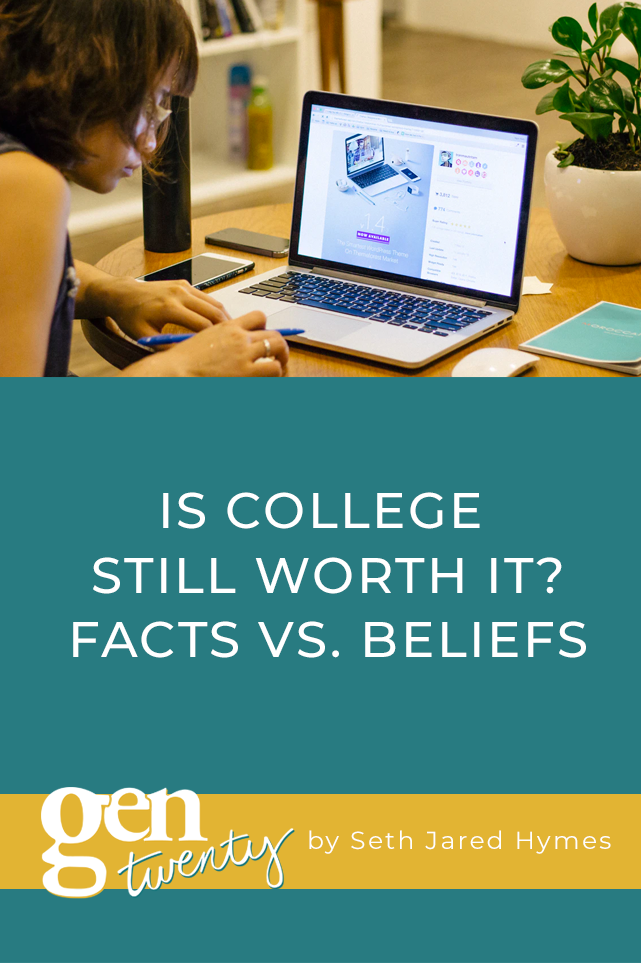
Is college still worth it in 2019-20? Most people still believe that it is.
But is that belief valid or outdated?
I believe in True Love and that someday the Mets will win the World Series again. Kids believe in Santa Claus, and North Koreans believe that their leader doesn’t go to the bathroom.
Beliefs are wild and unreliable. I don’t “believe” in the engineering that allows international flight possible, I get on a plane and it takes me from LA to Hong Kong. If it didn’t, I’d be taking a boat.
Doctors used to believe that Heroin and Cocaine were wonderful and safe painkillers. They also believed Cigarettes posed no health dangers. It wasn’t until rigorous studies and critical thinking were applied that these things were learned to be deadly.
Today, the conventional belief continues to be that in spite of the mounting risks, college remains a safe and diligent choice.
But college is a major financial investment with serious repercussions and life altering consequences. Every year millions of young people begin their adult life saddled with tens or hundreds of thousands of dollars in debt without any practical idea of how to begin. Yet most people still make this enormous decision based on a belief. And many parents won’t even allow this belief to be questioned.
[Tweet “College is a major financial investment with serious repercussions and life altering consequences… is it still worth it?”]
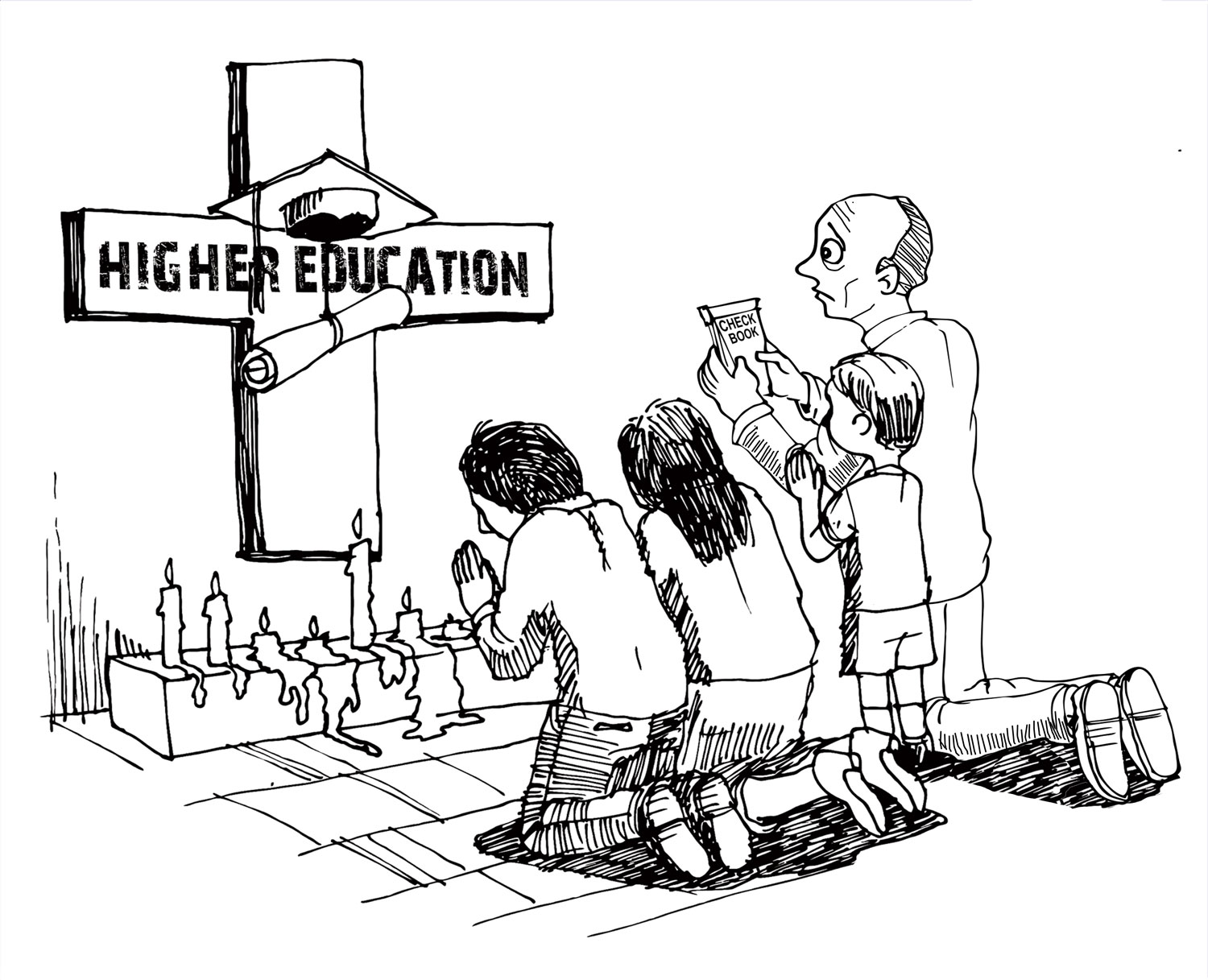
Shouldn’t it should be determined by an analysis of facts and statistics and, not just an ideology, hope, or dream?
Here are some true facts… as well as some common beliefs.
Fact: Student Debt is approaching $2 Trillion and rising.
Student debt has been steadily growing for the past 20 years, reaching $1.49 Trillion in 2019. That’s more than total Credit Card or Auto Loan debt. In a study by the National Association of Realtors, 80% of Millennials surveyed said they were unable to buy a home because of their student debt.
College is seen as a solid investment because it’s supposed to lead to more money and a better life. But this incredible debt load begs a simple common sense question: if College actually did lead to higher wages and success, why is this number growing so fast? Shouldn’t graduates be able to pay off their loans?
Fact: Tuition has risen 8x faster than wage growth.
Here’s why grads can’t pay their loans.
According to the Federal Reserve Bank of St. Louis, the cost of college has risen from about $52,000 in 1988 (adjusted for inflation) to $104,480 in 2016. At the same time, median wages have risen from $54,0042 in 1989 to only $59,039 in 2016.
WHAT?
That’s crazy. You can’t pay down a loan on a product that costs twice as much with a wage that has only risen by a small percentage.
It’s even more crazy if you dig in deeper. According to the Economic Policy Institute, Wage Growth for College Grads between 1979-2000 was .9%, much higher than High School Graduates rate of -.2%. But between 2000-2012, that changed dramatically.
College Grad’s wage growth dropped to .1%. People with only a High School Degree’s wage growth actually rose to -.1%, very close to that of people with a College Degree.
And this was all happening while college tuition has been skyrocketing. I mean, the cost of the degree is rising more than 3.9% a year while wage growth for degree earners is only .1%?
Something worth thinking about.
Fact: College Graduate Underemployment (people working jobs that don’t require a degree) is over 40%.
Unless you majored in Engineering or Nursing, chances are you will be working at a job that didn’t require a degree in the first place. According to the Federal Reserve Bank of New York, the overall Underemployment rate of graduates is 42.9%, 4 out of 10 grads.
But for many of the most popular majors, this number is even higher. You might expect that Performing Arts (Acting and Dancing) students have a 65% Underemployment Rate.
But it’s only slightly higher than Business Management Majors, who have a 59.6% Underemployment rate. Liberal Arts Majors have a 58.4% Underemployment Rate, only slightly higher than General Business majors which come in at 56%
History and Communication Majors have a 53% Underemployment Rate.
Do you want to incur all that debt for a job you could’ve gotten without a degree?
Fact: Unemployment for recent grads is 3x higher than national average.
And that’s for people lucky enough to get a job.
The Unemployment Rate for people aged 20-29 with a Bachelor’s Degree is 12.3% in 2018, 3 times the national average of 3.7%.
The number doesn’t actually reflect how bad it is for college graduates.
The Bureau of Labor Statistics also said that in October 2018, among 20-29 year olds who had received a Bachelor’s Degree, only 72.3% were employed.
That means 27.7% were not employed.
That’s even higher than the Unemployment rate of 12.3%. And about 7.4 times the national average. Those are Great Depression era numbers.
Here’s what this number really means. The actual unemployment rate is based on the percentage of people who apply for unemployment benefits. Not everyone does that. But, still according to the BLS, 16.8% of the people who aren’t employed aren’t in the labor force. That means they aren’t working, and they didn’t apply for benefits. They might be going back to graduate school to incur more debt or sitting on their parent’s couches playing Xbox.
By the way, the Unemployment Rate for people with an Advanced Degree Ages 20-29 is 10.4%, slightly less than those with a BA and still more than twice the national average.
Fact: Most millennials cannot afford to buy a house, and 80% say the reason is their student loans.
Belief: College leads to earning more money.
Fact: College earning statistics are scientifically inaccurate and highly misleading.
Ever since you were a baby you were told that a college degree leads to success. But you were probably never told how, or shown any real proof of this claim. It may be shocking then to learn that, statistically, that claim is completely false.
The reason this reality has escaped the public imagination for so long is because it requires you to dig a little deeper than surface statistics. So first, there’s a concept we need to grasp called “Selection Bias.”
Bear with me through this concept, because this will forever change how you look at what a college degree is actually worth.
Let’s say I created a new nutritional bar called “SethBoost” bars. And I tell you, my new bar is so good, it makes PowerBar look like dog food. It turns you into a stamina machine, makes you stronger, faster, and able to leap tall buildings in a single bound. In fact, I can show you a study that proves my new bar leads to a huge 1300% increase in push ups in the people who ate it.
Now – the appropriate thing to do for an actual scientific study would be for me to get 100 Athletes of relatively the same age, weight, height, and fitness level.
I’d take 50 of them and call them the Control Group. They would not get SethBoost Bar.
I’d take 50 of them and call them the Variable Group. They would get SethBoost Bars.
We’d then study their performance, which would be push ups done in one minute in this case. And at the end of the day we’d have some pretty solid data to determine if my Nutritional Bars had an impact.
As you can imagine, unless my bars were filled with cocaine or steroids, there wouldn’t really be much of a difference between the Control and Variable group, if all 100 people were all Athletes of relatively the same size, weight, age, and fitness level.
It might look something like: the Control Group Did 100 Push Ups, the Variable Group Did 100.5 Push Ups. You wouldn’t really be able to conclude that my bars made much of a difference.
But what if I did the study differently, to make it appear my bar was really effective?
What if instead of 100 Athletes of the same age, weight, height, and fitness level… I grab 50 Random Out of Shape people and 50 Fit Athletes.
And what if instead of dividing them into two different groups ahead of time, I just lump them into one giant 100 person group?
And what if instead of giving out my bars intentionally and scientifically, I just let the participants pick out whatever they want to eat, giving them a huge buffet filled with chicken wings, pasta, SethBoost Bars, cake, and pizza?
And then I say, GO!
So the generally Out of Shape people ignore my SethBoost bars and choose to go running right for the buffet. They feast on pork chops, onion rings, and mozzarella sticks. The Athletes end up choosing my SethBoost Bars, because they don’t want to eat greasy unhealthy food (and we haven’t provided any carrots or rice).
It’s madness!
I then analyze the entire group. And lo and behold, the people who ate SethBoost Bars all did 100 push ups while those who didn’t eat SethBoost Bars did 5 push ups!
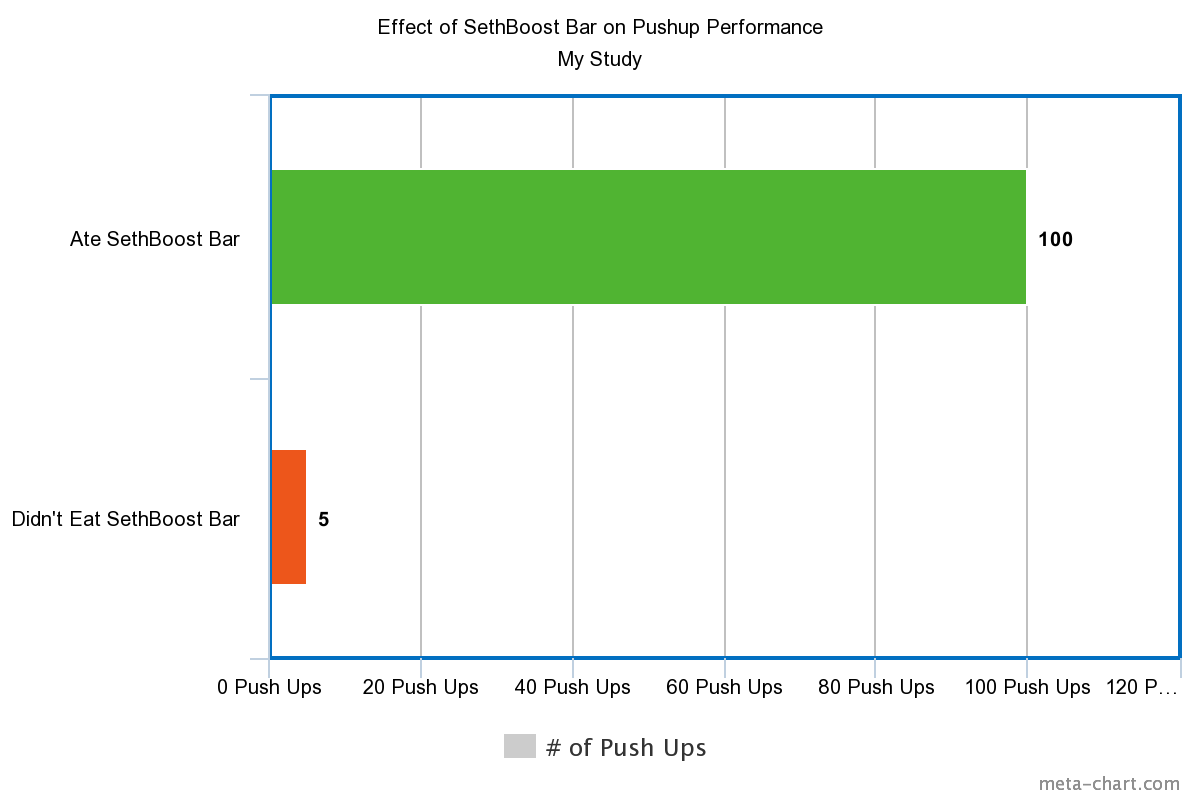
Whoa! My bars are miraculous! They cause people to do 1300% more Push Ups!
Ha ha, right. You can see how blatantly misleading and inaccurate this is.
What happened is, the people who happened to eat my bars also happened to be the most fit people. The bar had nothing to do with their performance.
This is exactly what happens with college earning statistics. And it’s the reason why Middle Class families think it’s a good idea for their 20 year old to start life with $100,000 in debt.
Nearly every article you’ve ever read or Teacher who has told you that College leads to more money has used the exact same misleading statistic to back this up.
This statistic comes from the Bureau of Labor and Statistics, and it’s from a chart called “Earnings by Educational Achievement.” This isn’t a scientifically sound study of data and salaries with a control group and a variable.
Driven students with high aptitude aren’t put in the same group with other high achieving students. Low achieving students aren’t separated from the high achieving students.
No, everyone is lumped together, in the same way I mixed up the Athletes and the Out of Shape people in the SethBoost Bar study.
And participants aren’t administered the item being tested (a degree) in a controlled manner. It’s more like the crazy buffet in the SethBoost Bar study.
High achieving students choose college. Low achieving students only get a High School degree. Really low achieving students don’t even finish high school.
And the graph says: “People with a College Degree earn $1,173/week while people with only a High School Diploma earn $712.”
Then, in the news or in your favorite blog you read:
“Holy cow! The people who got a College Degree make 64% more every week! An extra $461 a week – that’s $23,000 a year! That’s about $1Million over 40 years!
Getting a College Degree Leads to Making A Million Dollars More!”
This has led to major publications cautioning impressionable high schoolers and their parents that they will be literally be missing out on $1 Million if they don’t get a degree.
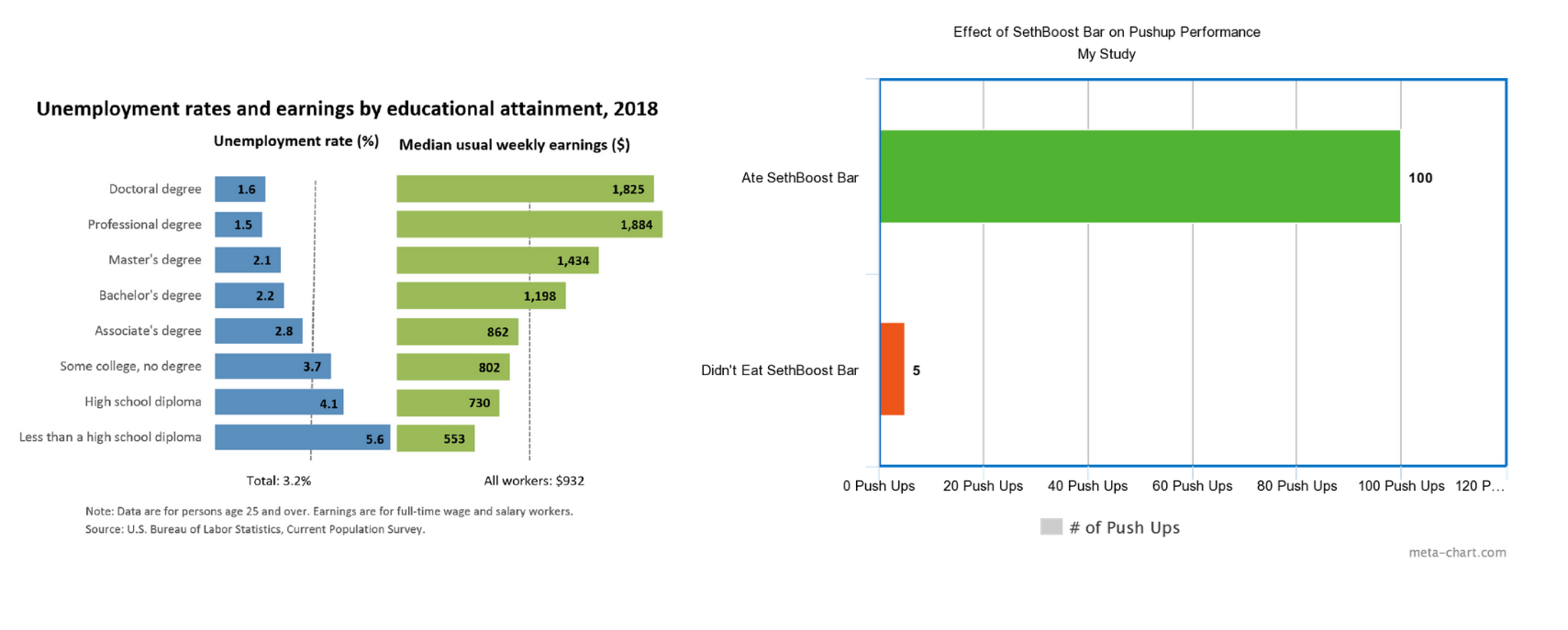
That’s as insane as saying my SethBoost Bars lead to 1300% more push ups.
High aptitude students aren’t successful because of the 4 years they spent studying Milton and Dante, they are successful in the long run because they have a Higher Aptitude.
Students aren’t separated into a Control and Variable group beforehand. You’ve got D students mixed in with future Doctors.
Then when they go on to eventually earn more money, the college takes credit for their achievement. That’s exactly the same thing I did with the SethBoost Bar.
This is called “Selection Bias.” It’s the distortion of an experiment’s data when proper randomization (control and variable) isn’t achieved.
To truly see if college made a difference, you’d need to take 1000 college ready students. Send 500 to college, have 500 skip college. In 4 years you’d see that the ones who skipped didn’t end up sleeping on the street, they’d likely be 4 years ahead of their peers who wasted 4 years and thousands of dollars in a classroom.
Take someone like Karen Chalco. Karen knew she didn’t want to spend time and money on a degree, so she went online and learned relevant skills in Digital Marketing through my online course. These skills won her an internship and a job at an Agency, and she eventually went on to get her own freelance clients making $52K a year. Last year she accepted a job at Glassdoor making $88,000. They even paid to relocate her from Ohio to San Francisco.
She did all this without needing a college degree.
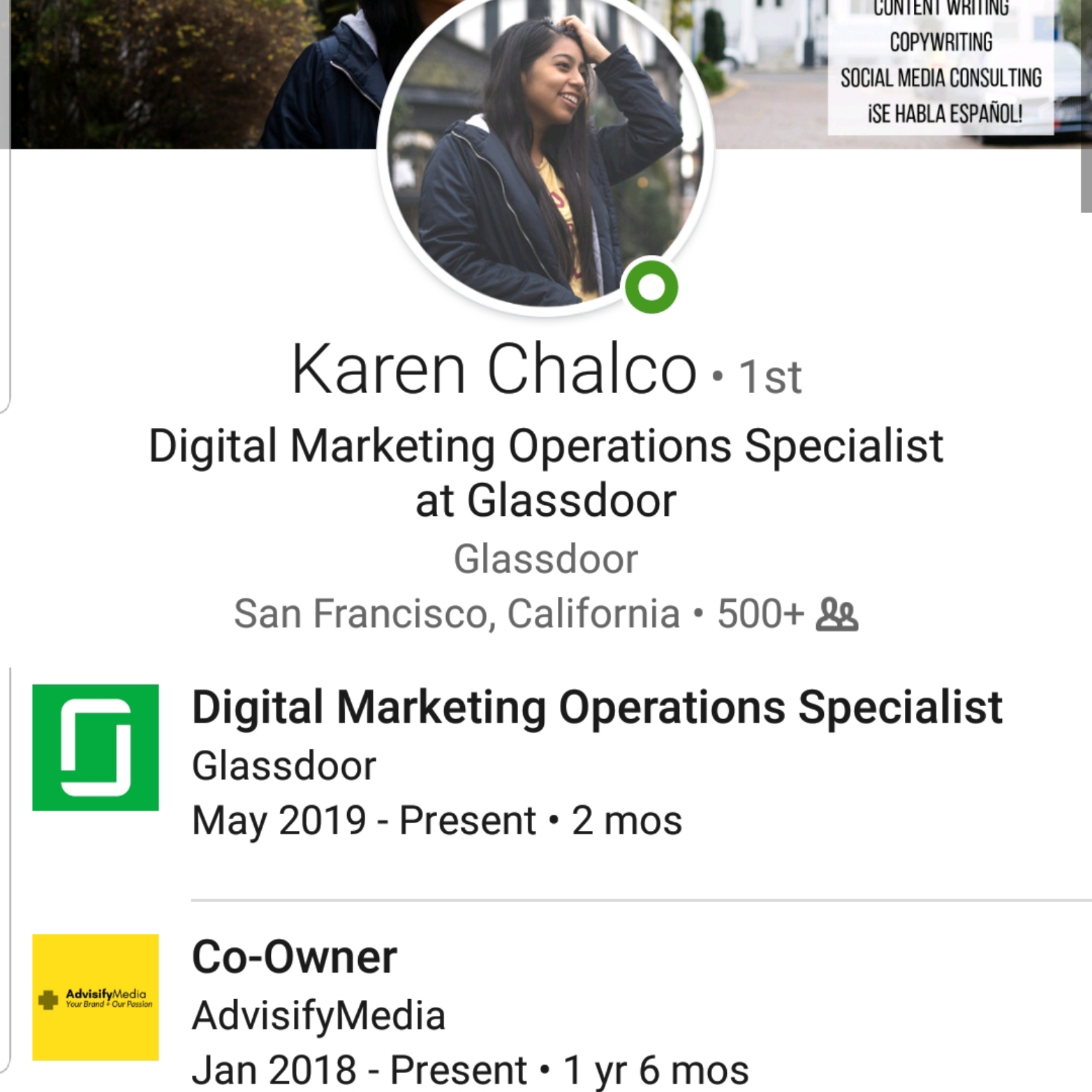
High aptitude, driven people do not become successful because they spent 4 years studying Dante and the French Poetry.
This is why you see Student Debt continuing to increase and such high unemployment and underemployment for college graduates.
Belief: You can’t get a (good) job without a degree; A degree is your “foot in the door.”
As we saw earlier, a large number of college graduates are either Underemployed (working jobs that don’t require a degree), or Unemployed (not working at all).
Every year you’ve spent about 1,000 hours in school. That’s 12,000 hours over 12 years. And during those 12,000 hours, you’ve spent 0.0 hours learning about job or money.
Kind of crazy, right?
The reality is that what’s taught in school for those 12,000 has nothing to do with the kind of jobs that area available for recent graduates. Most grads can only get work in three fields: Administrative (Office Work), Customer Service, and Sales (Retail).
You can go to Aftercollege.com to see this for yourself.
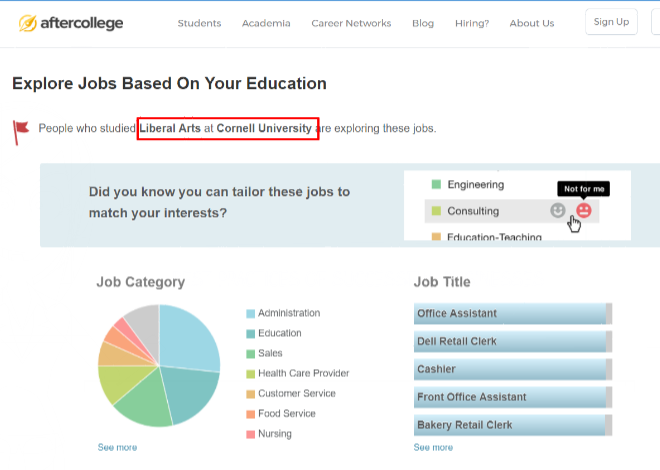
Now, do you really think you need a degree to file paper, fill in spreadsheets, answer phone or operate a Cash Register? No.
Employers don’t care about your degree (unless you majored in Engineering or Nursing).
They care about skills.
Skills are the things that you use to actually do the jobs that are out there.
Like, if you wanted a job as a truck driver, you’d take a quick certification course on how to operate a truck and then go get a job. If you want to become a Real Estate agent, you take some courses as dictated by the state and apply for a license.
Most jobs don’t require a license or certification, they just require that you know how to do the job. If you look at an actual job listing (something nobody does in 12,000 hours of school), you will see that they actually list the requirements right there.
That’s how Karen was able to go from no degree to $50K a year clients to working at an $88K/year job. It isn’t magic, she simply learned how to do things that companies needed done!
That’s the solution to this entire problem. Once you realize that college is more than likely a wasteful mistake, you need to go and get marketable in demand skills that employers need.
I know this because in 2010, I was an unemployed college grad with no idea how to support myself. I was broke and clueless. Then, I stumbled into the field of digital marketing, teaching myself skills that employers need. By 2011 I had a nice agency job managing $1 Million of advertising. 3 years later I was making six figures at a private company.
That was the power of having an in demand skill, not a degree.
Since 2016, I’ve been teaching people what to do instead of college, providing detailed guidance on the in demand skills of digital marketing. I do more than just teach theory, I actually show people how to get jobs. People like Shin Park, who at 21 dropped out of her expensive college and took the course.
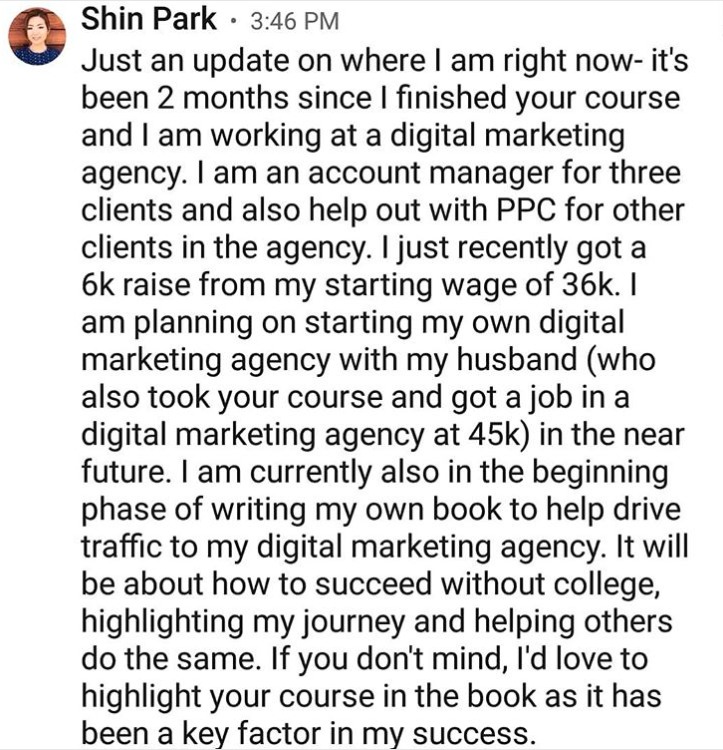
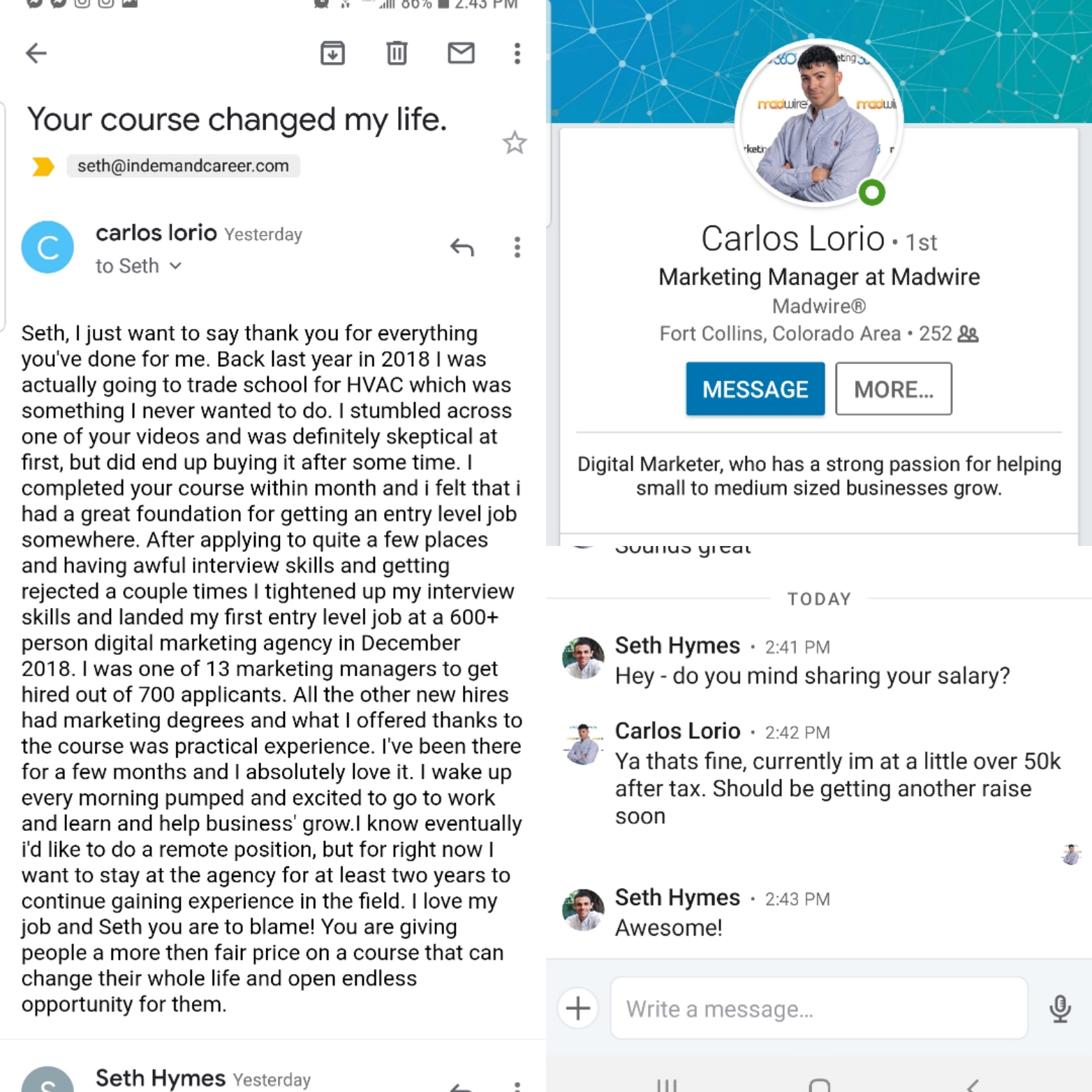
I’ve even helped people with college degrees who were struggling and in debt after graduation. Like Ken Choi, who had 2 (yes two!) Bachelor Degrees and couldn’t get a single job interview a year after finishing college.
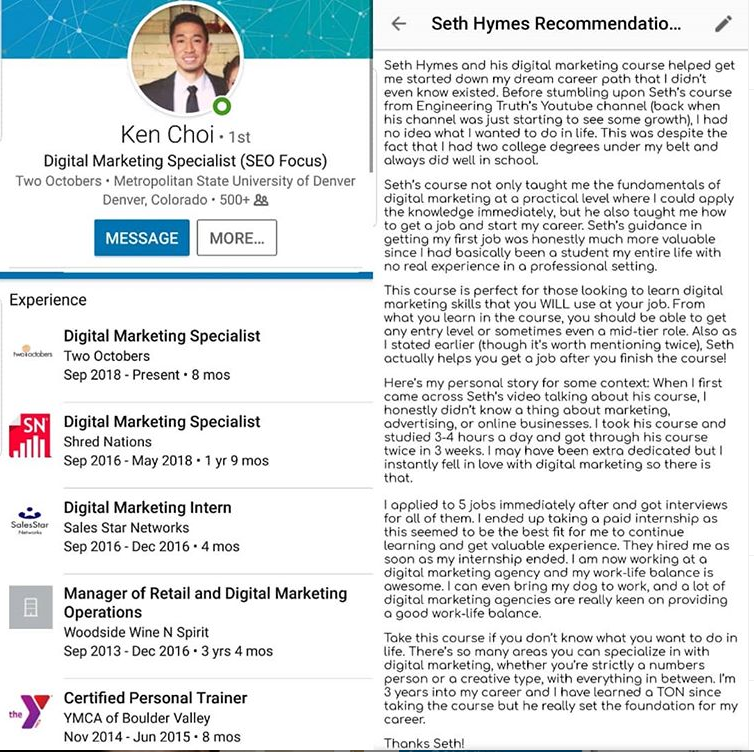
I hope this article has helped open your mind to some new possibilities about life and college. Once you wise up to the reality and start looking at facts, not beliefs, you are freed up to start exploring better and more powerful options. Skipping College is a faster, smarter, and cheaper path to success.
If you’d like more information about the in demand skill set of digital marketing, you can check out my free introductory course called “How to Get a $60K/Year Career in Digital Marketing (With No Previous Experience or Education)” by clicking here.
And if you’d like more in depth, detailed, and brutally honest advice about school, careers, and life, then check out my new book “Skip College for Success: A Liberation and Empowerment Guide for Young Adults to Grow, Not Owe,” now available on Amazon.
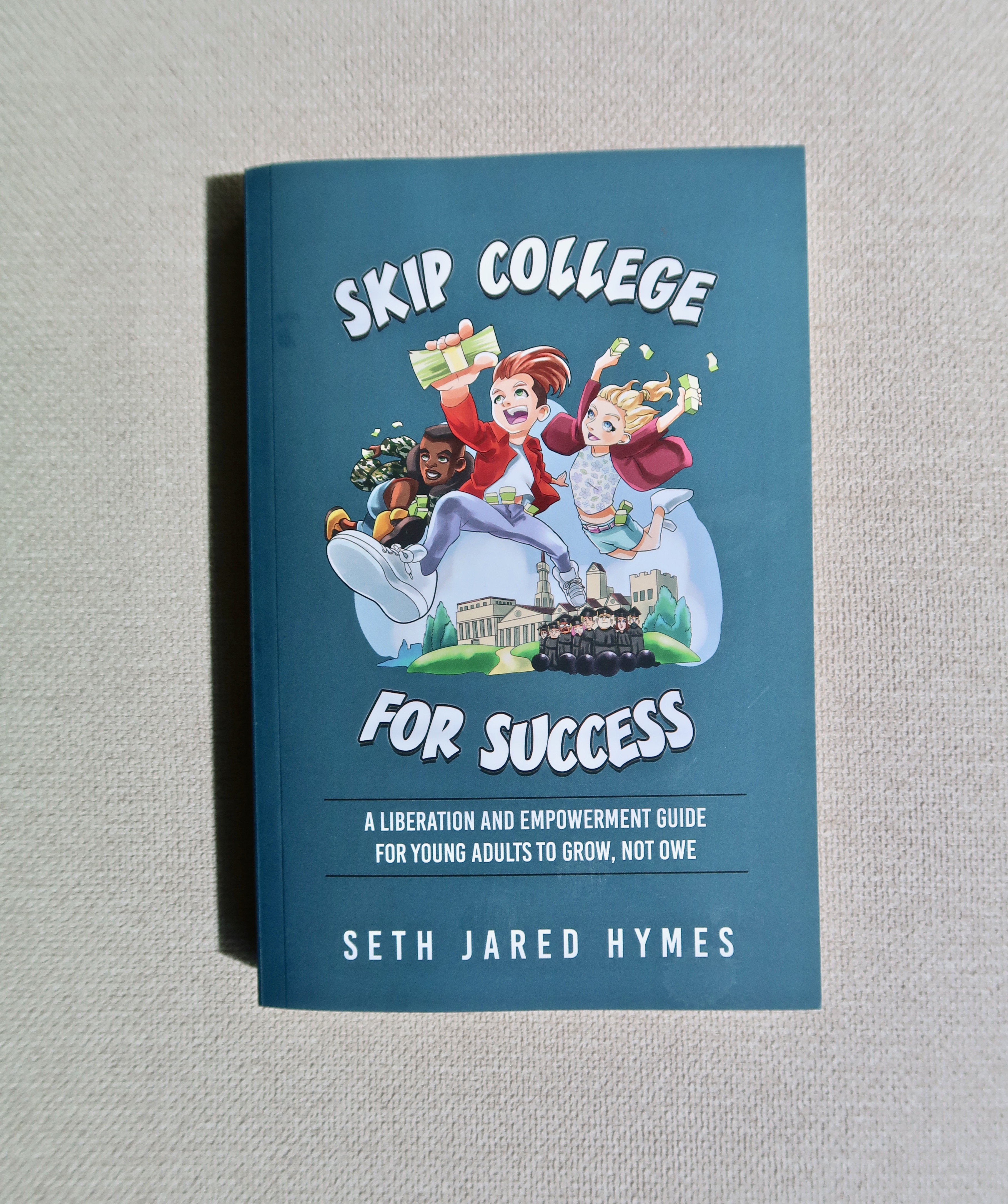
By Seth Jared Hymes
Seth Jared Hymes is an Educator, Speaker, Filmmaker and Business Coach who has helped thousands of people change their lives and start careers in Digital Marketing via his site https://indemandcareer.com.
Seth graduated NYU in 3.5 years with honors and went on to work as a waiter, pizza delivery driver, receptionist, cabana boy, and a Laser Range Safety Officer before finally acquiring marketable skills and earning a respectable income in Digital Marketing.
He delights in providing young people with practical no BS advice about the things in life that actually matter. He is currently traveling the world, spreading awesomeness throughout the land.
